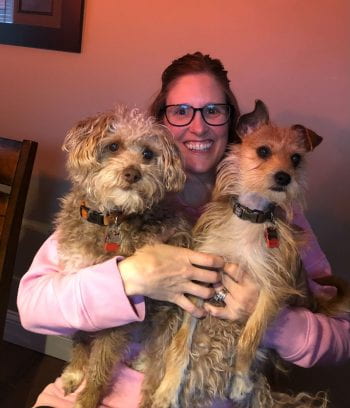
Jennifer Holzhauer, MSW, LCSW
Child & Adolescent Psychiatry
Jennifer has taken an active approach to her role since joining the Champion network in January 2021. She immediately recruited several co-champions to help impact various divisions within the Department of Psychiatry: Angela Williams, Rebecca Light-Pearlman, and Katherine Aravamudan. Working together as a cohesive unit, they used the Human-Centered Design based workplace wellness scan to survey their colleagues about how the workplace affects their health and well-being. This survey provided data they could then use to personalize wellness efforts within their workgroups. Recently, Jennifer has been focusing on a trauma-informed approach to care within her department and across the university; an approach that helps us engage others with a sense of empathy and compassion. I’m working closely with Jennifer to learn more about this movement and how I can incorporate it into Wellness Champion training.
What motivates you to volunteer as a Wellness Champion?

I specialize in trauma-informed care through my role in the Department of Psychiatry, and I have a lot of compassion and passion about how work can take a toll on the well-being of colleagues. It’s well established that if we are unwell, we have less success and satisfaction with our work; this can impact those we work with and those we care for, both at work and in our personal lives. Being a Wellness Champion provides me with agency and resources to help myself and my team; it’s fulfilling.
Are there any unique aspects of your department that make it particularly challenging or rewarding to be a Wellness Champion?
The department structure can be challenging. We are a large department that has various licensing requirements and types of providers. Divisions are siloed from one another and even within divisions, there are programs that operate individually based on funding. Then there are the various pressures, like billing expectations, patient and other stakeholder satisfaction, multiple funders, extensive documentation requirements, etc.
Although these are some of the challenges, they are also the reasons why I am so rewarded by attempting to improve this situation. We could always use additional co-champions but for now, Katherine Aravamudan, Rebecca Light-Pearlman, and I are doing some great work for the folks that work in the clinic at 4444 Forest Park Ave (mental health services for children). Many of these people are in some of the most precarious positions. Not only is it important to take care of ourselves for ourselves and our families but it is imperative to be able to provide mental health services. We have to be well to help others be well. We are more at risk for burnout, compassion fatigue, and vicarious trauma with the work that we do bearing witness and attempting to intervene with our patients/clients’ traumatic experiences. Part of my self-care is working on things that feel worthwhile for me and being a Wellness Champion is a big component of that. I am grateful for the support of my division chair, Dr. John Constantino, and for the rest of the teams’ willingness to hear from me about these issues.
Tell us about some actions you’ve taken to foster a culture of well-being in y our department.
our department.
Twice a month I email those within my sphere of influence with information from the Wellness Champion newsletters or the HR Thrive newsletters. Our office manager, Sunny Streibig, helps to keep our bulletin boards updated with information that can be useful to the staff. Along with the other Co-Directors of the Clinic, Sunny and I attempt to make changes that will help foster a trauma-informed system, including but not limited to:
- Emotional & Physical Safety: by decorating and posting flyers with safety messages to all.
- Trust and Transparency: keeping people apprised of our efforts in meetings.
- Voice and choice: asking for feedback in weekly division meetings and using this to guide efforts moving forward.
- Peer Support & Collaboration: building out a space for people to convene, where they can enjoy coffee we’ve made available and view the bulletin board that helps make people aware of what colleagues are working in what spaces, along with inspirational quotes and other information.
- Cultural Humility: celebrating differences and encouraging participation in current events that are important to our diverse team.
These are the tenets of a trauma-informed system and are tantamount to the well-being of our providers and patients/clients.
I’ve enjoyed getting to know Jennifer over the past year and appreciate her commitment to the Champion role as well as her willingness to teach me how to incorporate a trauma-informed approach to Wellness Champion training. Jennifer, thank you for being such a valuable asset and helping to keep your department aware of resources to maintain their health and well-being!

Become a Champion! If you’d like to learn more about the Wellness Connection Champion network and how to foster a culture of health and well-being in your department, check out our website: hr.wustl.edu/wellness-connection/champions/.